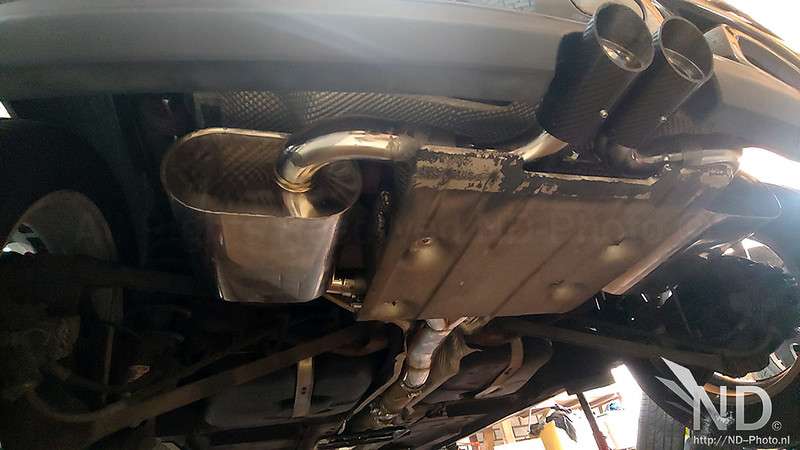The muffler vs exhaust symptoms have varying impact on your vehicle’s overall performance and the environment. The muffler and exhaust system work in tandem to reduce noise and regulate emissions from the engine’s combustion process.
Extend the lifespan of your beloved ride significantly through proper maintenance of your muffler and exhaust system. In fact, it is not only beneficial for your car but also for the environment.
Proper maintenance of your muffler and exhaust system ensures efficient airflow, minimizes harmful pollutants and takes care of other vital parts of the car engine.
Muffler sound.
The role of a muffler is reducing the annoying noise generated by an engine. The muffler reduces engine noise by utilizing various internal chambers and baffles that absorb sound waves.
The design of the muffler determines its sound-dampening capabilities. Therefore, it offers customization options for different sounds.
Mufflers are specifically engineered to minimize exhaust noise to ensure a more pleasant driving experience for both the passengers and those around. Exhaust mufflers effectively reduce the sound produced by the engine through a combination of pipes, tailpipes, and resonators.
Mufflers help absorb and dissipate engine noise, resulting in quieter operation. Different muffler designs can produce unique sounds, allowing for customization based on personal preferences.
Tuning the exhaust system with specific mufflers can enhance or alter the sound emitted by the vehicle. Mufflers not only reduce noise but also play a vital role in controlling emissions and waste fumes.
Do mufflers make the exhaust louder?
Contrary to popular belief, mufflers are designed to make the exhaust quieter, not louder. Removing or modifying a muffler can result in a louder exhaust note.
However, this may also lead to legal issues due to noise regulations in many areas. It’s important to consider local laws before making any modifications.
Mufflers are specifically engineered with chambers and baffles that help dissipate sound waves and minimize the loudness of the exhaust. This reduces the noise produced by the exhaust system.
Consequences of altering or removing the muffler.
Mufflers strategically redirect and absorb sound waves to reduce overall noise levels. While some car enthusiasts may desire a louder exhaust for aesthetic or performance reasons, altering or removing the muffler can have consequences.
(a). Lack of noise reduction.
Without a muffler, the exhaust gases exit directly from the internal combustion engine without any noise reduction, resulting in a significantly louder sound.
(b). Infringement on law enforcement.
This modification may attract unwanted attention from law enforcement agencies due to noise regulations in place. Many jurisdictions have specific decibel limits that vehicles must adhere to, and exceeding these limits can lead to fines or even vehicle impoundment.
It is essential for individuals considering modifications to their exhaust systems to research and understand local laws regarding noise emissions before proceeding.
(c). Noise pollution bothering other road users.
It’s worth noting that excessive noise levels can be bothersome for both drivers and pedestrians alike. Noise pollution can contribute to stress levels, impact quality of life, and disturb residential areas.
Legal considerations for amplifying your car’s sound.
Legally amplifying your car’s sound requires you to consider the many jurisdictions and their specific regulations regarding vehicle noise levels.
Modifying your exhaust system without adhering to these regulations can result in fines or penalties. Some regions require vehicles to undergo noise testing as part of their annual inspections.
Research and understand local laws before making any changes. It’s important to keep in mind that there are legal considerations you need to be aware of.
- Jurisdictions have specific regulations.
Various jurisdictions have specific regulations in place regarding the noise levels produced by vehicles. Failure to comply with these regulations can lead to hefty fines or other penalties. Therefore, before you decide to make any modifications, take the time to research and understand the local laws that apply in your area.
- Noise testing during annual vehicle inspection process.
One common requirement imposed by certain regions is noise testing as part of the annual vehicle inspection process. During this test, authorities measure and assess the sound emitted by a vehicle’s exhaust system. If your car fails this test due to excessive noise levels resulting from modifications, you may face consequences.
- There are specific regulations governing vehicle noise for each jurisdiction.
To avoid running afoul of the law and potential penalties, familiarize yourself with the specific regulations governing vehicle noise in your jurisdiction. This includes understanding permissible decibel limits or any restrictions on aftermarket mufflers or exhaust systems. Keep in mind that even seemingly minor alterations can sometimes push your car beyond legal limits.
- Consult government websites or professionals.
Before making any changes, consult reputable sources such as official government websites or seek advice from automotive professionals who are knowledgeable about local regulations. Enjoy a modified exhaust system without worrying about legal repercussions by taking these precautions and ensuring compliance with relevant laws.
Functions of muffler.
Controlling exhaust backpressure, reducing noise levels, emission control, and ensuring optimal engine efficiency and power output are some of the functions of muffler.
- Control exhaust backpressure.
Besides reducing noise, mufflers also help control exhaust backpressure. Backpressure affects engine performance by influencing airflow through the system.
Proper backpressure ensures smooth airflow and improves engine performance. By controlling backpressure, mufflers prevent damage to other components of the exhaust system.
- Engine noise level reduction.
Mufflers reduce noise levels emitted by the engine, making the vehicle quieter.
- Emission control.
Modern mufflers often include catalytic converters that reduce harmful emissions. Some modern mufflers incorporate catalytic converters for emission control.
Catalytic converters convert toxic gases into less harmful substances through a chemical reaction. The incorporation of catalytic converters in mufflers contributes to cleaner air quality.
- Engine efficiency and power output.
A properly functioning muffler ensures optimal engine efficiency and power output.
Pros of using a muffler.
Fuel efficiency and overall engine performance, engine noise reduction, fulfillment of law requirements and optimizing the flow of exhaust gases are some of the pros of using a muffler.
- Optimizes the flow of exhaust gases.
Apart from keeping things hushed, mufflers also contribute to better fuel efficiency and overall engine performance. They help optimize the flow of exhaust gases, allowing the engine to operate more efficiently. Exhaust gas recirculation which minimizes vehicle exhaust pollution is a function that’s facilitated by the exhaust muffler.
- Engine noise reduction.
Mufflers are like the silent heroes of your vehicle. They work behind the scenes to keep things calm and running smoothly. Engine noise levels reduction offers a more comfortable ride.
Mufflers make your ride quieter, so you can enjoy a more peaceful driving experience without the loud rumbling noise from the engine.
- Fuel efficiency and overall engine performance.
Another of their key advantages is their contribution to better fuel efficiency and overall engine performance. By optimizing the flow of exhaust gases, mufflers help your engine operate at its best.
- Fulfillment of law requirements.
Moreover, having a muffler is often required by law in many places. So by using one, you’re not only being considerate towards those around you but also ensuring that you comply with legal requirements.
In many places, having a muffler is not just a choice but a legal requirement. So by using one, you’re not only abiding by the law but also avoiding any potential fines or penalties.
Cons of using a muffler.
Some high-performance mufflers may slightly restrict airflow, affecting engine power.
Certain muffler designs can be expensive to purchase and install.
Over time, mufflers can deteriorate due to corrosion or internal damage, requiring replacement.
In rare cases, faulty mufflers can cause exhaust leaks, leading to potential health hazards.
Difference between muffler and exhaust.

The muffler is just one component of the entire exhaust system. The exhaust system includes pipes, catalytic converters, resonators, and other components.
While the muffler focuses on noise reduction, the exhaust system also affects emissions control and engine performance. Understanding this difference helps in making informed decisions about modifications.
Benefits of a vehicle exhaust system.
Optimized airflow, reduction of harmful emissions, positive impacts on the vehicle’s power capabilities and sound are some of the benefits of a vehicle exhaust system.
- Optimizing airflow.
An efficient exhaust system is crucial for optimizing airflow in your vehicle’s engine, leading to improved performance. By effectively channeling the exhaust gases away from the engine, it allows for smoother and more efficient combustion, resulting in increased horsepower and torque output.
- Reduction of harmful emissions.
Reducing harmful emissions is another significant advantage of using an exhaust system. With the help of specialized components such as catalytic converters and mufflers, it significantly decreases the release of pollutants into the environment. This not only ensures compliance with environmental regulations but also promotes a cleaner and healthier atmosphere.
- Impacts vehicle’s power capabilities.
Upgrading your exhaust system can have a direct impact on enhancing your vehicle’s power capabilities. By replacing stock components with high-performance alternatives, you can unleash additional horsepower and torque potential. The installation of aftermarket exhaust pipes, for example, reduces restrictions and increases overall engine efficiency.
- Vehicle sound.
Furthermore, a well-designed exhaust system can provide your vehicle with a distinctive sound. The careful selection of components like exhaust pipes and valves can create a deep growl or aggressive roar that adds character to your ride. Whether you desire a subtle rumble or a thunderous roar, upgrading your exhaust system offers customization options to suit your preferences.
Drawbacks of using the wrong vehicle exhaust system upgrade.
Non-compliance with local emission regulations, decreased fuel efficiency, upgrades are costly compared to individual component replacements among other drawbacks of using the wrong vehicle exhaust system upgrade.
Using an exhaust system in your vehicle has its drawbacks. Let’s take a look at some of the key points to consider:
- Non-compliance with local emission regulations.
It’s important to note that certain aftermarket exhaust systems may not comply with local emission regulations. These systems can release exhaust gases and harmful emissions into the environment, contributing to air pollution.
- Decreased fuel efficiency.
Poorly designed or incorrectly installed exhaust systems can lead to decreased fuel efficiency. When the system is not optimized for your vehicle, it can result in inefficient combustion and wasted energy, ultimately affecting your mileage.
- Costly upgrades compared to individual component replacements.
Upgrading the entire exhaust system can be quite expensive when compared to replacing specific components like mufflers only. If you’re on a budget, it might be more cost-effective to focus on individual parts rather than investing in a complete overhaul.
- Excessive noise levels.
Extreme modifications made to the exhaust system may cause excessive noise levels that violate legal limits. While some people enjoy the roar of a loud exhaust, it’s important to consider local noise regulations and respect those around you who may not appreciate the added noise.
Making the choice between upgrading mufflers or exhaust systems.
Consider your priorities. If you’re looking for a way to reduce noise and comply with local regulations, a muffler might be the right choice for you. On the other hand, if you want to enhance performance and achieve a more aggressive sound, an exhaust system could be the way to go.
Regardless of your choice, remember that modifying your vehicle’s exhaust system should always be done within legal limits. Make sure to familiarize yourself with local regulations before making any modifications. Consult with professionals who specialize in automotive customization to ensure that you make an informed decision based on your specific needs and preferences.

